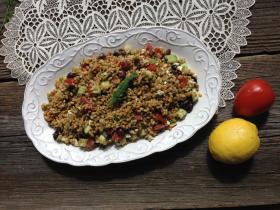White rice and potatoes healthier if prepared in certain way.
Carbohydrates have largely been shunned by the health-conscious in recent years but certain kinds do not actually cause weight gain, research has indicated.
Known as resistant starches, they naturally occur in certain carbohydrate-rich foods such as beans and legumes, whole grains and even rice and potatoes.
The Dukan and Atkins diets, both hugely popular, limit intake to little to no carbohydrates in their initial stages and have contributed to their bad reputation.
But consultant dietician Rebecca McManamon, from the British Dietetic Association, said carbs were an important part of our food intake and urged caution over reducing them too drastically.
"You will achieve weight loss in the short term but it is not sustainable," she said.
"Carbohydrates per se will not make us gain weight. Certain fibres that we get from carbohydrates can be of benefit to us."

This is how much your toddler should really be eating
Where people go wrong, Ms McManamon said, is with “portion distortion”.
“The portions that we are presented with in restaurants are often bigger than we require,” she explained.
Resistant starches get their name because they resist digestion – and pass through our body differently to their refined counterparts.
Unripe bananas, some seeds and brown rice flour also contain them.
Dietitian Sian Porter says carbohydrates are such a broad category and people should know that they are not all the same.
She said: "It is the type and quantity of carbohydrate in our diet that is important.
"While we should reduce the amount of sugar in our diet, we should base our meals on starchy carbs. There is strong evidence that fibre, found in whole grain versions of starchy carbs for example, is good for our health.”

The healthy food that you're not eating - yet
According to the NHS, “about half of your daily calorie intake should come from starchy foods, fruit and vegetables”.
Certain foods even develop resistant starches when left to cool – including pasta, potato and white rice.
Professor Paul Arciero, an expert in health and exercise sciences at New York's Skidmore College, conducted a study into exploring resistant starches as a healthy food for people with type-2 diabetes.
He told Time: “After you eat a meal that’s principally carbohydrate, the fact that your body can burn a greater percentage of fat as its energy source is very unusual.
“If you can combine a resistant starch with a hardboiled egg, or whey protein, or pea protein, or chicken or Greek yogurt, that’s a pretty powerful combination."
Starchy foods fill the stomach, boost energy and give the brain a serotonin kick.
Whole grains are high in fibre and have been linked to preventing ailments from heart disease to bowel cancer. They are also rich in B vitamins, iron and potassium.
Nutritional therapist Libby Limon, said: “Some people can eat grains with no problem at all. It depends on your individual ability to digest grains, and on your immune system and blood sugar regulation.”

